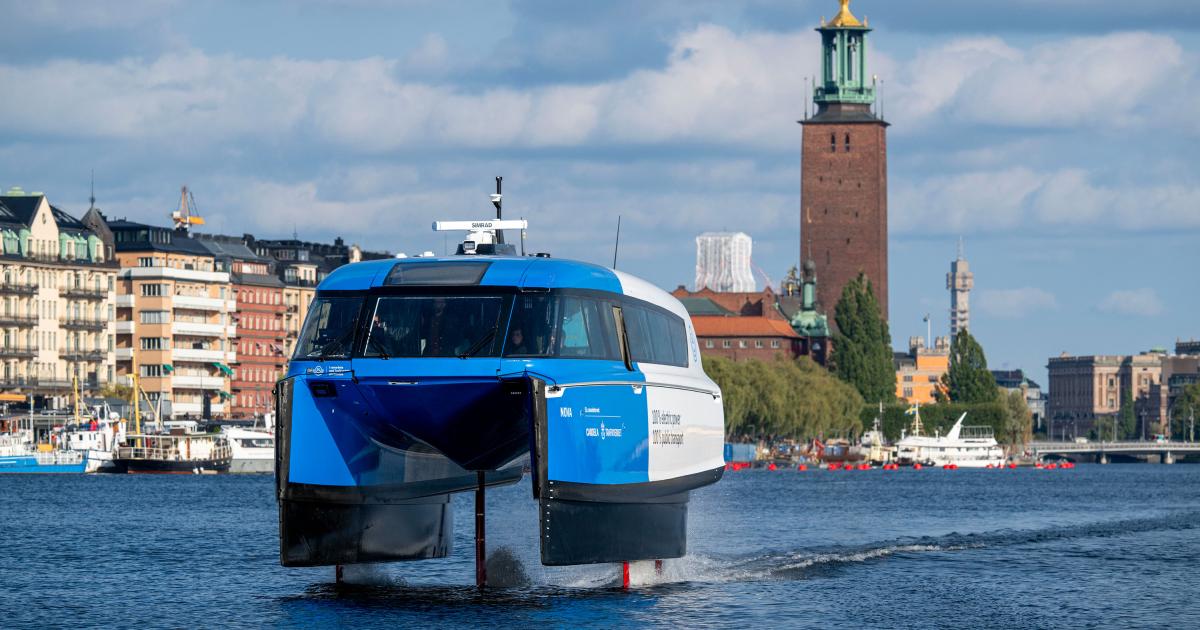In an era marked by the urgent need for sustainable practices, innovative solutions are emerging across Europe, driven by dedicated teams and committed projects. We met some of these initiatives at the last edition of the European Maritime Day in Cork, and here is a gist of what we discovered.
Fully electric ferries in Sweden
Candela is a Swedish company manufacturing zero-emissions waterborne transport solutions. Candela’s hydrofoiling electric boats are already in use in Stockholm as part of the city’s public transport. “We are saving 97.5% of CO2 per passenger/kilometre compared to the traditional diesel ferries”, explained Tord Ringenhall from Candela.
These fast boats, almost flying on water, have the potential to cut energy use by 80% and reduce noise pollution close to zero. A win-win situation both for the environment and the daily users.
With the zero-net climate target in sight, clean transport solutions are definitely high on the political agenda, but so are innovations making the food and feed chain more sustainable.
Small mussels for dogs
Baltic Muppets, an EU-funded project, is marketing Baltic mussels in Sweden for the pet food market. “Baltic mussels remain small, so there is very little interest in farming and commercialising them for human consumption”, explained Maya Miltell, the project coordinator.
And that’s too bad, as mussel farming could reduce eutrophication and improve the water quality in the Baltic Sea. Baltic Muppets saw an opportunity – why not turning the small mussels into nutritious pet food? “What we do now is create a viable business case for pet food from mussels, as they are a very sustainable source of protein.” From the videos on display at the stand, it’s clear that Baltic Muppets’ mussels are a dogs’ favourite. And that’s not just yet. The shells are turned into garden fertiliser, which will be commercially available in Sweden in autumn 2025.
Bringing seaweed in your everyday life EU4Algae, the EU-funded initiative promoting and supporting the EU algae sector, put innovative businesses in the algae sector under the spotlight with an impressive selection of food, cosmetics, and personal hygiene solutions made from microalgae and seaweed.
Just to name a few:
the canned products from BettaF!sh offer a plant-based alternative to hot smoked salmon and canned tuna. With the cheeky name of “Sal-nom” and “Tu-nah”, BettaF!sh put on the market two products that can boost seaweed consumption, provide fishing communities with an alternative business model, and bring more sustainability to food production.seaweed crackers from Nordic SeaFarm, a Swedish company growing seaweed in the salty Swedish waters and researching new innovative ways of farming seaweed at scale in the ocean.made in Germany by a female-led company, Vyld developed tampons made from seaweed, which are bio- and marine degradable.spirulina from Aitana Spirulina, a Spanish company Aitana Spirulina growing spirulina with 100% self-generated solar energy and naturally purified rainwater.
Every year, the European Maritime Day brings in a special sense of community. It shows how the EU blue economy is walking a clear path towards sustainable growth, making the EU a powerhouse for innovation.
Go raibh maith agat Cork for this great journey of discovery through the EU blue economy!
We look forward to discovering more projects and innovative ideas in Limassol next year, the city hosting EMD 2026!
